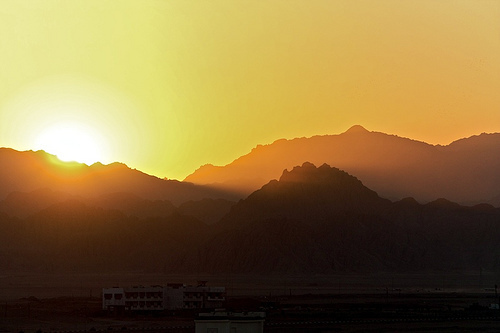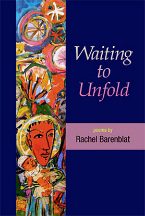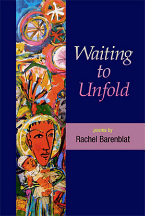Rachel Barenblat's Blog, page 189
May 15, 2013
After the summit, the climb: a Shavuot teaching
This is the teaching I offered late last night at our Tikkun Leyl Shavuot. It's loosely adapted from the Netivot Shalom, a.k.a. the Slonimer Rebbe, a.k.a. R' Shalom Noach Berezovsky. I originally translated it for a Hasidut class taught by R' Elliot Ginsburg; this version is streamlined a bit for easier teaching.
Someone once asked my teacher why on a first visit we can come directly to him and all the gates are opened to us, but on the second visit everything is closed. He answered with a parable:
You're taken up to the top of a high mountain, and you see the view that is all around you, and notice how glorious it is there. After that, you're brought back down to the bottom. And now, you must begin to climb up to the summit under your own power.
Once you see how wonderful it is up there, that encourages you to use your own strength to get back there. Initially, we receive enlightenment from above, that we might see with our own eyes how good it is to serve God. As Psalm 34 says, "Taste and see that God is good!"
After that, we're returned to our original (spiritual) place. But now we can go up on our own, now that we know where the heights are and how wonderful they are. That's what gives us the strength to push ourselves to climb.
On the first day of Pesach, we receive enlightenment from above. (It's as though we received a cosmic download of divinity, all compressed into a tight bundle, and we spend the 49 days of the Omer unpacking that download, lighting up each individual quality within ourselves which corresponds to the divine quality of that day.)
The energy, the potential, for climbing up to Shavuot comes from the illumination of that first day of Pesach. The first seder lights us up and inspires us to climb.
The seven weeks of the Omer are a time of spiritual preparation, during which we ready ourselves to receive the Torah. At the moment of the giving of the Torah, all seven heavens are open. All of our middot, the spiritual qualities which we share with God, are open and illuminated.
The experience of constriction, Mitzrayim, tarnished us. But on the first night of Pesach, God awakens us from on high. That awakening gives us the strength to spend the next seven weeks cleansing ourselves from the residue which accrues when we enslave ourselves to worldly things.
Pesach is a moment of erusin, betrothal, when Israel as a people becomes given-over to God. The 49 days of sefirat ha-Omer are a period of preparation and courting, preparing for the moment of being lifted-up. And at Shavuot, we and God are wed.
During the 49 days of the counting of the Omer, we "turn from evil and do good," again in the words of Psalm 34. We turn from the evil of enslavement, and pursue the goodness of receiving Torah. We turn from the evil of our own worst impulses and bad habits, and pursue the goodness of our best qualities (which we share with God.)
Throughout this journey, we draw on the energy we experienced on high, that first Passover night, to carry us the rest of the way to union at the mountaintop again.
And when we work for it; when we come seeking God; when we make the climb; we awaken the process of the revelation of the Torah. We needed to get here under our own power, and now that we've made it, the revelation is ready to pour in.
Have you experienced feeling 'lifted up,' then having to work to get back there?
How can you "turn from evil and do good" in your own life?
What is the Torah you most need to receive this year?
Quiet your mind, go inward, and ask the Holy Blessed One for revelation.
May 14, 2013
The anniversary of the revelation of Torah
Photo, sunbeams at Sinai, by flickr user jacobwod.
Tonight and tomorrow are the anniversary of the revelation of Torah.
The anniversary. One of my favorite teachings holds that tonight, Shavuot, is the Jewish people's wedding anniversary with God. On this date we stood together with God. We and God pledged ourselves in everlasting covenant. The written Torah, that beautiful hand-calligraphed parchment scroll, contains our ketubah, our written agreement of the promises we and God make to each other. One teaching holds that on this date, God held the mountain of Sinai up in the sky -- that we stood not at the foot of the mountain, but quite literally beneath the mountain; that the mountain was our chuppah, our wedding-canopy, for our marriage with God. (Another midrash holds that God held the mountain over us as a kind of threat. But I like the wedding midrash better.)
The anniversary of the revelation. On this day, long long ago, we camped at the base of Sinai. The Torah uses a singular verb to say that we camped there, and Rashi reads that to mean that the Israelite people camped there as a single entity, with one heart and one purpose. On this day, long long ago, despite all of our frustrations and our differences, we were together at the mountain as one. We were one people, one heart, one community. And in that state of oneness, we entered into relationship with God. In that state of oneness, we received revelation. We experienced divinity. We experienced the theophany, God's revelation-of-God's-self, a transmission of something from beyond our ken.
The anniversary of the revelation of Torah. What was revealed? Some say that God spoke the Aseret ha-Dibrot, the Ten Commandments as we read them in Torah. Some say that God spoke only the first line, "I am Adonai your God," or perhaps only the first word, a great anochi reverberating. Some say that God spoke only the first letter, a silent aleph, and the whole rest of the Torah was communicated via ultra-compressed instantaneous download. The midrash teaches that each of us heard according to her or his own capabilities. Just as manna had a different taste for each person who consumed it, so the revelation reached different people in different ways. God spoke with one voice, but each of us heard the Torah which we most uniquely needed to hear.
My teacher Reb Zalman (Rabbi Zalman Schachter-Shalomi) teaches that the revelation wasn't just a onetime thing: it's happening even now. God broadcasts on all channels, and we hear on the frequencies to which we're attuned. Ours is not the only revelation; other peoples, other traditions, have received other revelations on the channels where they're tuned-in. They've perceived different facets of the Infinite. We're all like those blind men in the parable, each of whom thought the elephant was something different because of what he perceived when he reached out to touch. But the existence of other revelations doesn't obviate ours; you don't have to be wrong for me to be right. The revelation at Sinai was a burst of divine presence, a transmission from beyond -- and that transmission is still going. As the Browncoats say, you can't stop the signal.
Each of us is a kind of radio receiver, able to tune in to God's broadcast. On Shavuot, we open our hearts and attune ourselves to God. What's the revelation that you most need to receive tonight as the heavens open? What Torah does the world most need, right here, right now? What will you draw down and channel into the world this Shavuot?
May 13, 2013
Reb Zalman on morning prayer
Many of us think of prayer as a religious duty. Some take this seriously, loping smoothly through the well-worn formulas as a daily obligation. Others draw the line at an hour or two of synagogue on High Holidays. Both approaches have lost contact with the original prayer urge, the irrepressible surge of gratitude or the crushing hopelessness that brings forth true prayer. The idea that we ourselves might stand before God and pray from the heart is almost unthinkable.
But our souls accept only one outcome when it comes to prayer: transformation. We do not wish just to spin our mental wheels: We want to be changed. We want to be moved. We want to end in a better place than where we started. Our souls yearn for this. If we really mean the words we say, how can we help but be moved?
That's why davening takes us on a journey. This is especially true in the morning prayers. The Rabbis imagined us starting the minute we swing our feet over the side of the bed. We may wake up stiff and rumpled and bleary-eyed; we might feel cranky and old, already dreading half the tasks we have to do today. No matter: the invitation to prayer says "come as you are." We will start slowly, rise and go deeper, and return in a better frame of mind and spirit. Prayer properly and truly done -- even if we only spend twenty good minutes -- will leave us feeling cleansed and at peace, ready to greet the day with gratitude, energy, and purpose.
-- Reb Zalman (Rabbi Zalman Schachter-Shalomi), in Davening: A Guide to Meaningful Jewish Prayer
When I'm leading prayer at my shul and we reach the round of daily morning blessings -- usually called birchot ha-shachar, "blessings of the morning;" the current Reform siddur calls them Nisim She'b'chol Yom, the Miracles of Each Day -- I usually pause and note that these blessings were originally designed to be said at home, organically, as we're waking up.
We hear the rooster crow (or, more likely, the alarm clock or the footfalls of the small child padding up the stairs) and instead of thinking "oy, time to get up already?" -- or, perhaps, after thinking that! -- we think, "Oh! Blessed are You, Adonai our God, Source of all being, Who gives the bird of dawn the discernment to tell day from night!"
And then, getting up out of bed and stretching, we think: Oh! Blessed are You, Adonai our God, Source of all being, Who straightens the bent!
And then, as we take our first steps away from bed, we think: Oh! Blessed are You, Adonai our God, Source of all being, Who makes firm our steps! And so on, and so on.
"On the off-chance that perhaps you woke up this morning and didn't automatically pray these blessings," (I say, and usually people chuckle, which is exactly what I'm hoping for), "the creators of our siddur wisely added these blessings to the siddur, so that we can say them together this morning, with heart and with intention."
Prayer can be a lot of different things. But one of the modalities of prayer which I love best is this one: the chance to imbue ordinary moments with a consciousness of what's holy. The chance to offer gratitude. To rub the crust out of our eyes and thank God Who removes sleep from the eyes and slumber from the eyelids. To say: no matter who I am, or where I am, or what's going on with me today, I'm grateful to have woken up this morning, and to be alive.
May 11, 2013
A Shabbat afternoon poem
Saturday Afternoon Request
Help me to silence
my mind's aggravation alarm,
to quiet the voice which says
the to-do list matters,
to temporarily eschew
continuous partial attention.
Open me to long slow conversations
on the sunlit grass, to the beat
of the hand-drummers who accompany
the singing of psalms, to a boat
lazily drifting on the glassy surface
of my heart's own pond.
You're waiting for me
like a lover, eager
to embrace me again.
Remind me: this is the way
back to Eden, the bloom
on the thirteen-petaled rose.
I wrote this poem remembering some of the sweetest Shabbatot I've spent on retreat with my Jewish Renewal community -- days when, following a week of Torah study and learning, I was able to fully and wholly immerse myself in the sweetness of Shabbat, in a time apart from ordinary time, in a remembrance of Eden and a foretaste of the world to come.
The last line is a reference to a classical metaphor from the Zohar -- see R' Adin Steinsaltz's book of the same title.
Shabbat shalom to all!
May 10, 2013
Motherhood, the bitter & the sweet, in Zeek

Just in time for Mother's Day (in the US, anyway), I have a new essay out in Zeek. The essay tells the story of what becoming a mother was like for me. Here's where it begins:
My memories of the earliest months of parenthood are blurred by that perfect storm of surging hormones and sleep deprivation. In retrospect, I can’t imagine how we survived sleeping in 45-minute increments, much less learning how to care for a newborn while doing so. Even more disorienting: I wasn’t sure who I was, now that I’d had to set aside my identities as student, writer, scholar. In that one long day of labor, it seemed, I lost access to almost everything that had previously defined my existence. The exceptions were those stalwart souls who made the effort to stay actively in our lives despite the colicky infant — and, however faintly, poetry.
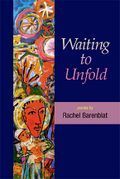 As the essay continues, I talk about postpartum depression and how dubious I was that anything would ever get better -- and about the miraculous fact that, once I got the help I needed, things did change. They didn't necessarily get easy, but they did change, and I am forever grateful.
As the essay continues, I talk about postpartum depression and how dubious I was that anything would ever get better -- and about the miraculous fact that, once I got the help I needed, things did change. They didn't necessarily get easy, but they did change, and I am forever grateful.
Over the course of the essay, prose is interspersed with excerpts from several poems from Waiting to Unfold. I think the essay contextualizes the poems in a certain way. Reading the collection takes you on a journey through my experiences of that first year. Reading this essay offers you that in microcosm, along with some of my thoughts about that year and about motherhood now that I've been doing this for three and a half years.
Here's another little taste of what the essay says:
There are times when parenting is an unalloyed joy, and at those
times it’s easy to feel connected: with my own mother and grandmother,
with all the mothers I know, with all the mothers who have gone before
me and who will come after me. I feel cradled in an endless chain of
blessing.
And there are also times when parenting is hard.
Miserable. Exhausting. Overwhelming. For those of us who have to wrangle
postpartum depression, those times may wildly outweigh the sweet ones,
for a while. I wish I could find every mother who feels the way I felt
in those early months, and say to her: it’s going to be okay. You are
not alone. It won’t always be like this.
Beyond that: feeling this
way doesn’t disqualify you from motherhood. There shouldn’t be shame in
not savoring every instant of exalted motherhood. And feeling that anhedonia,
that inability to savor — whether it’s fleeting or recurring — does not
exclude one from the community of mothers, the chain of connection as
far as the human imagination can see.
Read the whole thing here: The Bitter & the Sweet: Reflections on Motherhood. My gratitude is due to Erica Brody, the (new) editor at Zeek, for soliciting this essay and giving it a home.
Praise for Waiting to Unfold - from Kristen of Motherese
Despite major life-happenings -- a cross-country move in just a few weeks! -- Kristen of the fabulous blog Motherese has taken a few moments to say kind things about Waiting to Unfold. She writes:
Rachel’s collection records her first year of new motherhood. Through her beautiful images, Rachel perfectly captures the anticipation, helplessness, and humor of those early months. Reading her work, it occurs to me that poetry is the perfect medium for describing infancy – that of a child and that of a parent. As Rachel demonstrates so capably through crystalline details that capture the “punctuation mark” of a sleeping child “on the blank page of [his] crib” or his “sly and sideways” glance of defiance, poetry’s precision and concision slice to the core of these unretrievable moments. And although it’s ostensibly a collection about blossoming into motherhood, Waiting to Unfold feels full of metaphors for the journey I am about to take with my family: learning how to walk, as it were, in a new town, into a brave new world.
You can read the whole post (and wish her all the best in the upcoming move) here: Homeward Bound. Thanks for the kind words, Kristen! I hope your move brings you every blessing.
Waiting to Unfold costs $13.95 (US, CAN) / £9.10 / €10.66 and is available at Phoenicia Publishing and on Amazon (and Amazon UK and Amazon Europe) -- though publisher and author earn more if you buy it directly from Phoenicia. Still: buy it wherever works for you.
Praise for Waiting to Unfold - from Kristin Berkey-Abbott
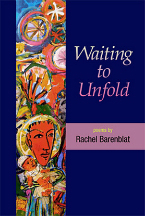
Poet Kristin Berkey-Abbott has published an incredibly gracious and glowing review of Waiting to Unfold at her blog. Here's a taste:
I'm not a mother, but I know a lot of mothers, and I imagine that this book reminds them of both the joys and the terrors of that first year of motherhood. But even if we haven't experienced those emotions first hand, the book can speak to us too.
I enjoyed it immensely, probably because it was honest in its exploration of that first year. Too many chronicles of the first year seem determined to refuse to admit that it's anything but glorious. Barenblat's poems are rooted in the every day, which includes the not-so-glorious, like a child who doesn't want to sleep, a child who explores the world in a terrifying, head-on, exhilarating way...
It's a collection that makes me return to my own life with a sense of wonder. After all, we've all been children, and most of us have been around children. I love poems like "Taste," poems that remind us of all the delights in store as we move from thin gruel to other, richer treats. The book is full of reminders of how much each day has to offer, if we can just slow down to savor them.
Read the whole review: A Great Book for Mother's Day -- or Any Day. Thank you, Kristin! I'm delighted that you enjoyed the collection so much (and that you caught the Psalms references!)
Waiting to Unfold costs $13.95 (US, CAN) / £9.10 / €10.66 and is available at Phoenicia Publishing and on Amazon (and Amazon UK and Amazon Europe) -- though publisher and author earn more if you buy it directly from Phoenicia. Still: buy it wherever works for you.
May 9, 2013
Distinctions: a poem for Havdalah
In the end we're like children:
we thrive on distinctions
between me and you, us and them.
Made in Your image
we separate light from darkness,
family from stranger, weekday
from that fleeting taste of Paradise.
Wax drips from the braided candle.
Cinnamon tingles the nose
to keep us from fainting
as the extra soul departs.
Stop now. Notice this hinge
between Shabbat
and what's next.
Plunge the candle into the wine
but don't cry: even without a flame
our light still shines. This
is our inheritance, better than rubies.
And now it's Saturday night, the cusp
of a new beginning, another day.
This week, may our hearts be whole.
This poem was written to accompany havdalah, the ceremony which ends Shabbat and begins the new week. (Though if you don't have the custom of making havdalah regularly, I suppose you could read this poem in place of havdalah; it's not the same as actually doing the ritual, of course, but it's a way of marking the transition with mindfulness.)
I'm experimenting with seven-line stanzas, meant to evoke the seven days of the week. "[T]o keep us from fainting
as the extra soul departs" is a reference to the teaching that an extra or second soul descends and enlivens us during Shabbat. We smell sweet spices at the end of Shabbat in order to revive ourselves despite the departure of that extra soul.
"[E]ven without a flame / our light still shines" is a reference both to the practice of extinguishing the havdalah candle in the sanctified wine, and to a line from the prayer we read as we begin havdalah: layehudim haita ora v'simcha v'sasson v'ikar, ken tihiyeh lanu, "and for the Jewish people there was light and joy, gladness and honor; so may it be for us."
May 7, 2013
Lessons in gratitude from a three year old
The last pink rays of afternoon light are coloring the very lip of the distant mountains. Everything else is already in shadow. Wind rustles the dragonfly chime, a periodic descant over the quiet song of spring peepers, a distant car, a barking dog. Our son is in bed; I'm on the deck as twilight begins to take over from afternoon.
Watching our son experience his fourth spring has been delicious. As excited as I've been to see the leaves unfurl (and I have; I relish this spectacular chartreuse unfolding every year -- spring is one of my very favorite seasons in New England), he's been more so. "Look, mommy," he keeps saying. "The trees are waking up! The trees are waking up!"
Each morning we pull up to his school's parking lot and he asks, "can we go see the purple flowers?" He means the stand of tulips along the walk by the bank, next door. "They growed up! They're so beautiful!" Beneath a flowering tree, he solemnly tells me, "this is the most beautiful tree I've ever seen."
I don't think I can take any credit for his finely-honed sense of wonder; I think it's innate to who he is. Or at least I hope it is. Family lore has it that my first word was "wow," and there are reasons why modah ani is my perennial favorite prayer. There's so much in the world to appreciate, so much to be grateful for.
All I can hope for is to help him cultivate and retain his gratitude and his willingness to say thanks. To the teacher who pours him a glass of water ("it's the best water I ever tasted!"), to his father ("thank you for building me a big-boy bed, daddy"), to the Holy Blessed One ("thank you God for this beautiful car!")
Thank You, God, for this beautiful child. Thank You, God, for this beautiful evening. Thank You, God, for everything.
A poem from Waiting to Unfold reprinted at Hugo Schwyzer's blog
Deep thanks to Hugo Schwyzer for sharing one of the poems from my new collection, Waiting to Unfold, on his blog. Hugo writes:
I don’t often put up poetry any more, but I want to make an exception this week to promote the new book from my friend Rachel Barenblat (also known as the Velveteen Rabbi.) I had a few of her lovely offerings up on my old Thursday Short Poem series, and I’m excited to announce her new poetry collection Waiting to Unfold. Rachel wrote one poem a week during the first year of her son’s life — and she beautifully captures the wonder, the fear, the exhaustion, and the surges of stupendous love of new parenthood. “Waiting to Unfold” would make a most excellent Mother’s Day Gift.
And then he shares one of the poems from late in the collection -- which hasn't been excerpted or shared anywhere else, to my knowledge. Here's his post: Tuesday Short Poem: Barenblat’s “And Then There Are Days”. Thanks, Hugo!
Waiting to Unfold costs $13.95 (US, CAN) / £9.10 / €10.66 and is available at Phoenicia Publishing and on Amazon (and Amazon UK and Amazon Europe) -- though publisher and author earn more if you buy it directly from Phoenicia. Still: buy it wherever works for you.
Rachel Barenblat's Blog
- Rachel Barenblat's profile
- 6 followers


